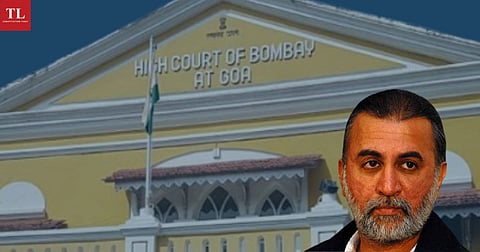

THE Bombay High Court bench at Goa Wednesday issued notice on an appeal filed by the Goa government against the acquittal in a rape case of Tehelka magazine's former editor-in-chief Tarun Tejpal.
There was a prima facie case to grant leave for the appeal, Justice SC Gupte observed, as he ordered notice to be issued and called for the records of the case from the trial court.
Justice Gupte pointed out that even without stating the prosecution case fully in the judgment, the sessions judge had 'straightaway given the gist of the case", and commented on the prosecution witnesses. He also remarked that the judgment seemed like a kind of manual on how rape victims must conduct themselves.
Solicitor General(SG) Tushar Mehta appearing for the Goa government submitted that the trial court verdict showed a complete lack of sensitivity for crime against the women and a complete absence of knowledge on the subject.
Mehta pointed out that during the cross-examinations, the trial judge remained a mute spectator and did not prevent the defence from asking questions that brazenly shamed the victim, Mehta said.
"We can't make out whether the victim was on trial or the accused," Mehta remarked. He also pointed out the amendment to the Evidence Act in 2013 which prohibits the defence from referring to the past sexual conduct or history of the victim.
"This judgment also defines unfortunately what is the ideal conduct of the victim of sexual harassment during the harassment and after the harassment", Mehta argued.
Mehta, in particular, referred to page 292 of the judgment in which the trial court said, "this was a narrative of extreme implausibility" and that it was not possible to believe that the prosecutrix, a woman who is aware of laws, intelligent, alert, and yoga trainer would not ward off the accused if she was being pushed the wall, especially when she was facing him and especially when the accused was coming uncomfortably close to her in a private space.
Mehta also brought to the notice of the court the reference made by the trial judge regarding senior advocates Indira Jaising and Rebecca John. He said the victim approaching these two lawyers had gone against the victim.
"If the victim had come to me for my guidance, I would have told her to meet Ms Jaising and Ms John. John is an eminent lawyer on the criminal side. Ms Jaising is discarded (by the sessions judge) because she is a feminist. I am posing a question to myself from day one: whether being a feminist is a negative qualification in this country" Mehta said.
"I am a feminist. Feminist means a person who believes in equal rights of man and woman," Mehta said and asserted that until the reference to the two lawyers was not removed from the judgment, no sexual victim would dare seek legal advice, which was their fundamental right under Article 21.
Justice Gupte said since this aspect would have to be considered by a regular bench in June and not the current vacation bench.
On May 21, Additional Sessions Judge Kshama Joshi pronounced the order acquitting Tejpal of offences under Sections 354 (assault or criminal force with intent to outrage modesty), 354A ((sexual harassment), 354B (assault or use of criminal force to woman with intent to disrobe),) 341 (wrongful restraint), 342 (wrongful confinement), 376 (2)(f) (person in position of authority over women, committing rape) and 376(2)(k) (rape by person in position of control).
In her 527-page judgment delivered on May 21, which was made available late Tuesday night, sessions court judge Kshama Joshi said the victim's actions such as "proactively" sending messages to the accused about her location in the aftermath of the alleged sexual assault did not support her "narrative of extreme implausibility".
The survivor had not exhibited any kind of "normative behaviour" such as trauma and shock which a victim of sexual assault might show, the judge opined.
Ruling that there was no medical evidence and there were "facts" that "create doubt on (her) truthfulness," the court said the woman's messages to the accused "clearly establish" that she was neither "traumatised nor terrified" and this "completely belies" the prosecution's case.